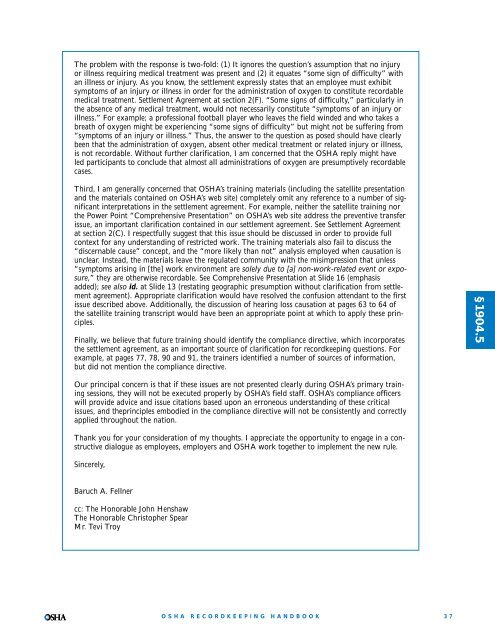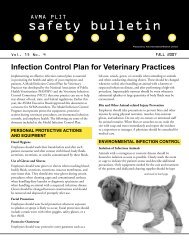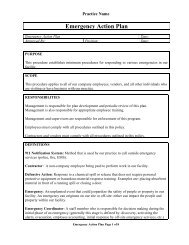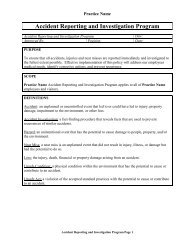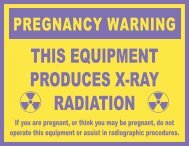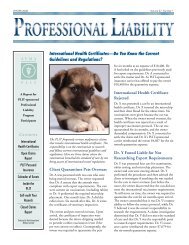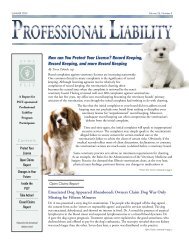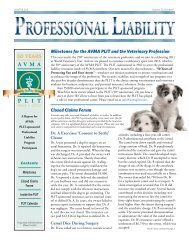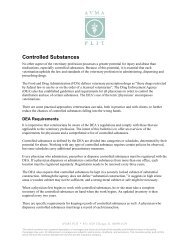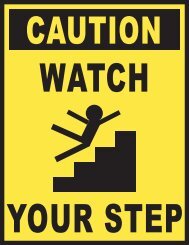November 19, 2002Joseph Woodward, Esq.Associate Solicitor for the Occupational Safety and Health AdministrationDepartment of LaborOffice of the Solicitor200 Constitution Avenue, NW, Room S-4004Washington, DC 20210Re: December 12, 2001 <strong>OSHA</strong> <strong>Recordkeeping</strong> TrainingWhile we very much appreciate the proactive efforts being made by the agency to provide trainingas it implements the new rule, I am writing on behalf of NAM to express my concern that theDepartment of Labor’s keynote training presentation regarding the new recordkeeping rule, itsDecember 12, 2001 satellite “webcast,” contained information inconsistent with our settlementagreement and omitted information central to that agreement.§1904.5First, as you know, an injury or illness is not presumed to be work-related unless “an event orexposure in the work environment is a discernable cause of the injury or illness or of a significantaggravation to a pre-existing condition.” See, inter alia, Settlement Agreement section 2(B) (emphasisadded). The Settlement Agreement restates this important principle: “Regardless of where signsor symptoms surface, a case is recordable only if a work event or exposure is a discernible cause ofthe injury or illness or of a significant aggravation to a pre-existing condition.” Id. (emphasisadded). In other words, it is not the location where signs or symptoms surface, it is the discerniblework-related event that defines causation and triggers recordation. In response to a questionregarding a pulled muscle that occurred in the workplace, but with which no identifiable workrelatedevent or exposure could be identified, the representative from <strong>OSHA</strong>’s Office of Statisticscorrectly noted that “if there is no event or exposure that led to the condition, I don’t think thatpresumption [of work-relatedness] would apply.” Transcript at pp. 44-45.* Another authoritative<strong>OSHA</strong> spokesperson, however, disagreed with his colleague and stated, “It sounds like a workrelated case to me. It sounds like the person was injured while they were in the work environmentand, yeah, I would consider that a work related case.” Id. at p. 45 (emphasis added). I am concernedthat this response and <strong>OSHA</strong>’s training materials impart an erroneous view of the so-calledgeographic presumption. Unfortunate events which occur to an individual while he is at work andengaged in normal life functions, such as walking over an even surface and pulling a muscle,should not be presumed to be work-related simply because they occur at work. Absent some otheridentifiable work-related event or exposure in the work environment, such a conclusion clearlyconflicts with the “discernable cause” rule to which <strong>OSHA</strong> agreed in the settlement. Any trainingto the contrary ignores the agreement’s imposition on the Secretary of Labor the burden of proofregarding work-relatedness and is contrary to its substantive provisions.Second, our settlement agreement clearly specifies that the existence of an injury or illness is athreshold inquiry and that, even where, for example, oxygen is administered, in the context ofworkplace exposure to a toxic substance, if an injury or illness did not occur, the case remains nonrecordable.See Settlement Agreement at sections 2(E), (F); accord Transcript at p. 86 (discussingnon-recordability of precautionary administration of antibiotics). In response to a question relatingto this specific issue, which assumed the prophylactic administration of oxygen without any toxicexposure or medical treatment, however, <strong>OSHA</strong>’s spokesperson replied that, “Under the new rule,oxygen is considered medical treatment. So if the person has an injury or illness ... if they’reexhibiting some signs of difficulty and they’re given oxygen, then that’s now considered medicaltreatment.” Transcript at p. 46 (emphasis added).* The transcript of the training session is available athttp://www.vodium.com/vs_data/transcript/labor8NG8Y91T.txt.36<strong>OSHA</strong> RECORDKEEPINGHANDBOOK
The problem with the response is two-fold: (1) It ignores the question’s assumption that no injuryor illness requiring medical treatment was present and (2) it equates “some sign of difficulty” withan illness or injury. As you know, the settlement expressly states that an employee must exhibitsymptoms of an injury or illness in order for the administration of oxygen to constitute recordablemedical treatment. Settlement Agreement at section 2(F). “Some signs of difficulty,” particularly inthe absence of any medical treatment, would not necessarily constitute “symptoms of an injury orillness.” For example; a professional football player who leaves the field winded and who takes abreath of oxygen might be experiencing “some signs of difficulty” but might not be suffering from“symptoms of an injury or illness.” Thus, the answer to the question as posed should have clearlybeen that the administration of oxygen, absent other medical treatment or related injury or illness,is not recordable. Without further clarification, I am concerned that the <strong>OSHA</strong> reply might haveled participants to conclude that almost all administrations of oxygen are presumptively recordablecases.Third, I am generally concerned that <strong>OSHA</strong>’s training materials (including the satellite presentationand the materials contained on <strong>OSHA</strong>’s web site) completely omit any reference to a number of significantinterpretations in the settlement agreement. For example, neither the satellite training northe Power Point “Comprehensive Presentation” on <strong>OSHA</strong>’s web site address the preventive transferissue, an important clarification contained in our settlement agreement. See Settlement Agreementat section 2(C). I respectfully suggest that this issue should be discussed in order to provide fullcontext for any understanding of restricted work. The training materials also fail to discuss the“discernable cause” concept, and the “more likely than not” analysis employed when causation isunclear. Instead, the materials leave the regulated community with the misimpression that unless“symptoms arising in [the] work environment are solely due to [a] non-work-related event or exposure,”they are otherwise recordable. See Comprehensive Presentation at Slide 16 (emphasisadded); see also id. at Slide 13 (restating geographic presumption without clarification from settlementagreement). Appropriate clarification would have resolved the confusion attendant to the firstissue described above. Additionally, the discussion of hearing loss causation at pages 63 to 64 ofthe satellite training transcript would have been an appropriate point at which to apply these principles.Finally, we believe that future training should identify the compliance directive, which incorporatesthe settlement agreement, as an important source of clarification for recordkeeping questions. Forexample, at pages 77, 78, 90 and 91, the trainers identified a number of sources of information,but did not mention the compliance directive.§1904.5Our principal concern is that if these issues are not presented clearly during <strong>OSHA</strong>’s primary trainingsessions, they will not be executed properly by <strong>OSHA</strong>’s field staff. <strong>OSHA</strong>’s compliance officerswill provide advice and issue citations based upon an erroneous understanding of these criticalissues, and theprinciples embodied in the compliance directive will not be consistently and correctlyapplied throughout the nation.Thank you for your consideration of my thoughts. I appreciate the opportunity to engage in a constructivedialogue as employees, employers and <strong>OSHA</strong> work together to implement the new rule.Sincerely,Baruch A. Fellnercc: The Honorable John HenshawThe Honorable Christopher SpearMr. Tevi Troy<strong>OSHA</strong> RECORDKEEPINGHANDBOOK37
- Page 1 and 2: www.osha.govOSHARecordkeepingHandbo
- Page 3 and 4: OSHARecordkeeping HandbookThe Regul
- Page 5 and 6: ContentsRecordkeeping HandbookRoadm
- Page 7 and 8: Section 1904.40Providing records to
- Page 10 and 11: §1904.0…OSHA has rejected the su
- Page 12 and 13: §1904.1Since publication of the re
- Page 14 and 15: §1904.2SIC code Industry descripti
- Page 16 and 17: §1904.2tinue to have injury and il
- Page 18 and 19: Section 1904.3Keeping records for m
- Page 20 and 21: PREAMBLE DISCUSSION: Section 1904.4
- Page 22 and 23: (viii)(ix)The illness is the common
- Page 24 and 25: §1904.5employment environment. For
- Page 26 and 27: §1904.5the employee’s status as
- Page 28 and 29: §1904.5Exceptions Proposed but Not
- Page 30 and 31: §1904.5pain and swelling in a join
- Page 32 and 33: §1904.5the worker has taken a side
- Page 34 and 35: §1904.526“Personal tasks” for
- Page 36 and 37: If the accident had occurred in a l
- Page 38 and 39: Scenario 4:• An employee reports
- Page 40 and 41: In applying [the presumption of wor
- Page 42 and 43: Letters of interpretation related t
- Page 46 and 47: Letter of interpretation related to
- Page 48 and 49: §1904.6that the two injuries or il
- Page 50 and 51: §1904.6…Under the OSHA recordkee
- Page 52 and 53: FREQUENTLY ASKED QUESTIONS: Section
- Page 54 and 55: Since the employee was not performi
- Page 56 and 57: In each of the eight scenarios in y
- Page 58 and 59: §1904.7other licensed health care
- Page 60 and 61: §1904.7that eliminates the routine
- Page 62 and 63: §1904.7pose. This paragraph also s
- Page 64 and 65: §1904.7Counting Lost Workdays When
- Page 66 and 67: §1904.7tors to such injuries and i
- Page 68 and 69: §1904.7This list of first aid trea
- Page 70 and 71: §1904.7visit to a health care prof
- Page 72 and 73: §1904.7However, as discussed above
- Page 74 and 75: §1904.766immediate recording of si
- Page 76 and 77: §1904.7strength? How is an employe
- Page 78 and 79: §1904.7or illness. The severity of
- Page 80 and 81: The first treatment is glue used to
- Page 82 and 83: Response: The employer would have t
- Page 84 and 85: Letter of interpretation related to
- Page 86 and 87: Letter of interpretation related to
- Page 88 and 89: §1904.8exposure” as these terms
- Page 90 and 91: ing blood and other potentially inf
- Page 92 and 93: standard. In some cases employers v
- Page 94 and 95:
PART 1904—[AMENDED] (67 FR 77170,
- Page 96 and 97:
§1904.1088OSHA RECORDKEEPINGcorrec
- Page 98 and 99:
§1904.1090OSHA RECORDKEEPINGAwaren
- Page 100 and 101:
§1904.1092reasonable checks agains
- Page 102 and 103:
§1904.1094determination. Second, t
- Page 104 and 105:
FREQUENTLY ASKED QUESTIONS: Section
- Page 106 and 107:
Also, from time to time we update o
- Page 108 and 109:
§1904.11Section 1904.11Recording c
- Page 110 and 111:
§1904.11of causation applies to th
- Page 112 and 113:
§1904.12Thus, the total MSD count
- Page 114 and 115:
§1904.12current survey was designe
- Page 116 and 117:
§1904.29son’s blood or other pot
- Page 118 and 119:
§1904.29cern cases, and the list m
- Page 120 and 121:
§1904.29have also been designed to
- Page 122 and 123:
§1904.29with that entry and employ
- Page 124 and 125:
FREQUENTLY ASKED QUESTIONS: Section
- Page 126 and 127:
Section 1904.29(b)(10). In addition
- Page 128 and 129:
Section 1904.30Multiple business es
- Page 130 and 131:
fest themselves quickly and can be
- Page 132 and 133:
§1904.31The term “employee” me
- Page 134 and 135:
§1904.31companies, and other tempo
- Page 136 and 137:
Letter of interpretation related to
- Page 138 and 139:
Scenario 5:• An employee drives i
- Page 140 and 141:
Response: The log is to be kept for
- Page 142 and 143:
Section 1904.32Annual summary(66 FR
- Page 144 and 145:
§1904.32The company executive cert
- Page 146 and 147:
Deletions from the former rule....F
- Page 148 and 149:
I do want to make one further point
- Page 150 and 151:
sede any longer retention periods s
- Page 152 and 153:
Response: The controlling employer
- Page 154 and 155:
Section 1904.35Employee involvement
- Page 156 and 157:
§1904.351904 regulation to provide
- Page 158 and 159:
§1904.35tions on employees’ and
- Page 160 and 161:
employee, the employer must provide
- Page 162 and 163:
Thank you for your interest in occu
- Page 164 and 165:
Letter of interpretation related to
- Page 166 and 167:
Section 1904.36Prohibition against
- Page 168 and 169:
and section 1952.4 spells out the r
- Page 170 and 171:
§1904.38Section 1904.38Variances f
- Page 172 and 173:
§1904.38cited and the citation is
- Page 174 and 175:
§1904.39PREAMBLE DISCUSSION: Secti
- Page 176 and 177:
§1904.39FREQUENTLY ASKED QUESTIONS
- Page 178 and 179:
§1904.40maintains the records at a
- Page 180 and 181:
June 23, 2003Mr. Edwin G. Foulke, J
- Page 182 and 183:
Section 1904.41Annual OSHA injury a
- Page 184 and 185:
Section 1904.42Requests from the Bu
- Page 186 and 187:
Section 1904.43Summary and posting
- Page 188 and 189:
Section 1904.44Retention and updati
- Page 190 and 191:
Section 1904.45OMB control numbers
- Page 192 and 193:
allows him or her to independently
- Page 194 and 195:
§1904.46the three criteria above,
- Page 196 and 197:
§1904.46approach will provide an i
- Page 198 and 199:
FREQUENTLY ASKED QUESTIONS: Section
- Page 200 and 201:
Section 1952.4Injury and illness re


